"The mother of all campaigns": inside Nigeria’s 100 million child vaccine drive
Health leaders say Nigeria will emerge from the ambitious drive better protected in the short term and more resilient in the long term.
- 30 October 2025
- 10 min read
- by Adnan Ahmad
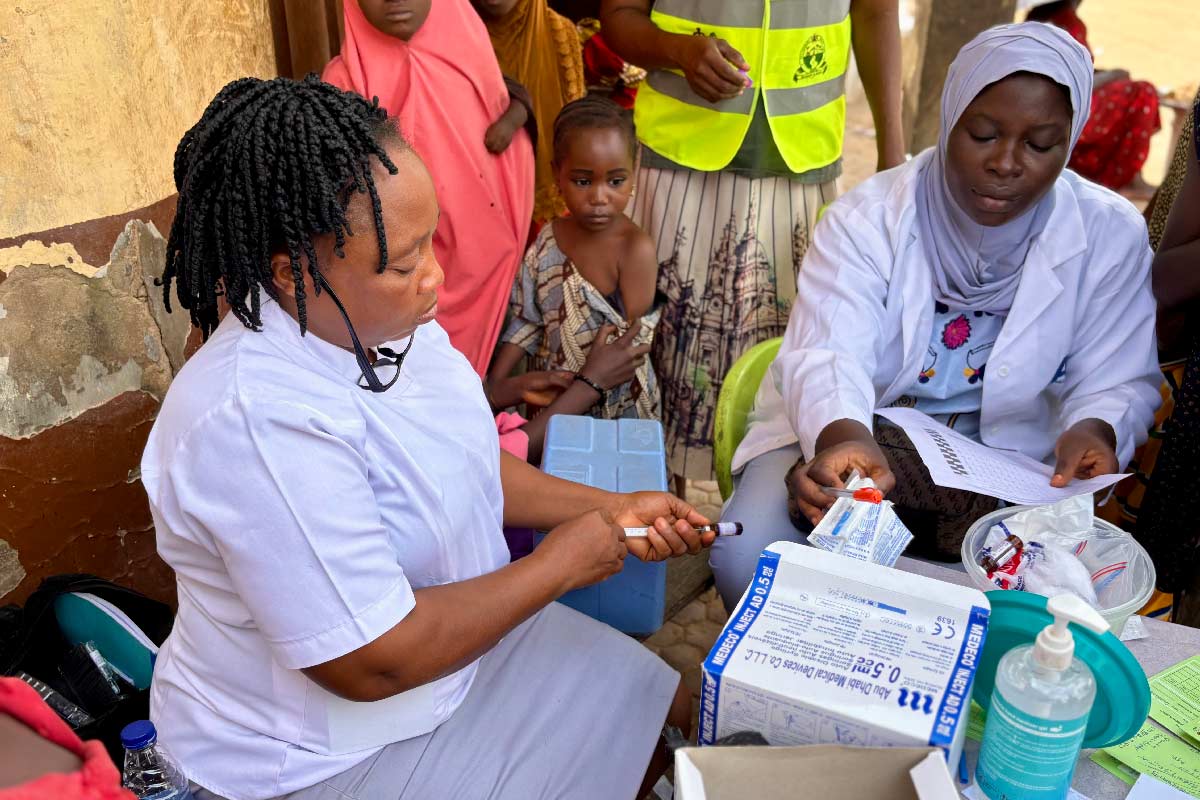
In Kuchigoro, a suburb in Nigeria’s capital city, Abuja, Daniel O. Esther, a community health worker, pressed a yellow plastic whistle to her lips and let out a sharp blast. At the sound, children began to gather, first three boys, then a boy and his sister, and within ten minutes, a crowd of children surrounded her. She held a packet of the same yellow whistles, promising to give one to every child after they receive their jab of the measles-rubella (MR) vaccine.
Nigeria has recently suffered a high burden of measles, with the Nigeria Centre for Disease Control (NCDC) reporting more than 18,000 suspected cases across all 36 states and the Federal Capital Territory (FCT) in 2024. The country’s low vaccination coverage, estimated at 57% for the first dose of measles-containing vaccine and just 35% for the second, is the major factor driving these outbreaks. Measles is a highly contagious virus, and 95% immunisation coverage is the threshold for herd immunity.
To address the spread of the disease while also preventing congenital rubella syndrome, Nigeria recently introduced the MR vaccine, and on 6 October 2025, the country’s Federal Ministry of Health, with support from partners, launched the nation’s largest-ever integrated vaccination campaign.
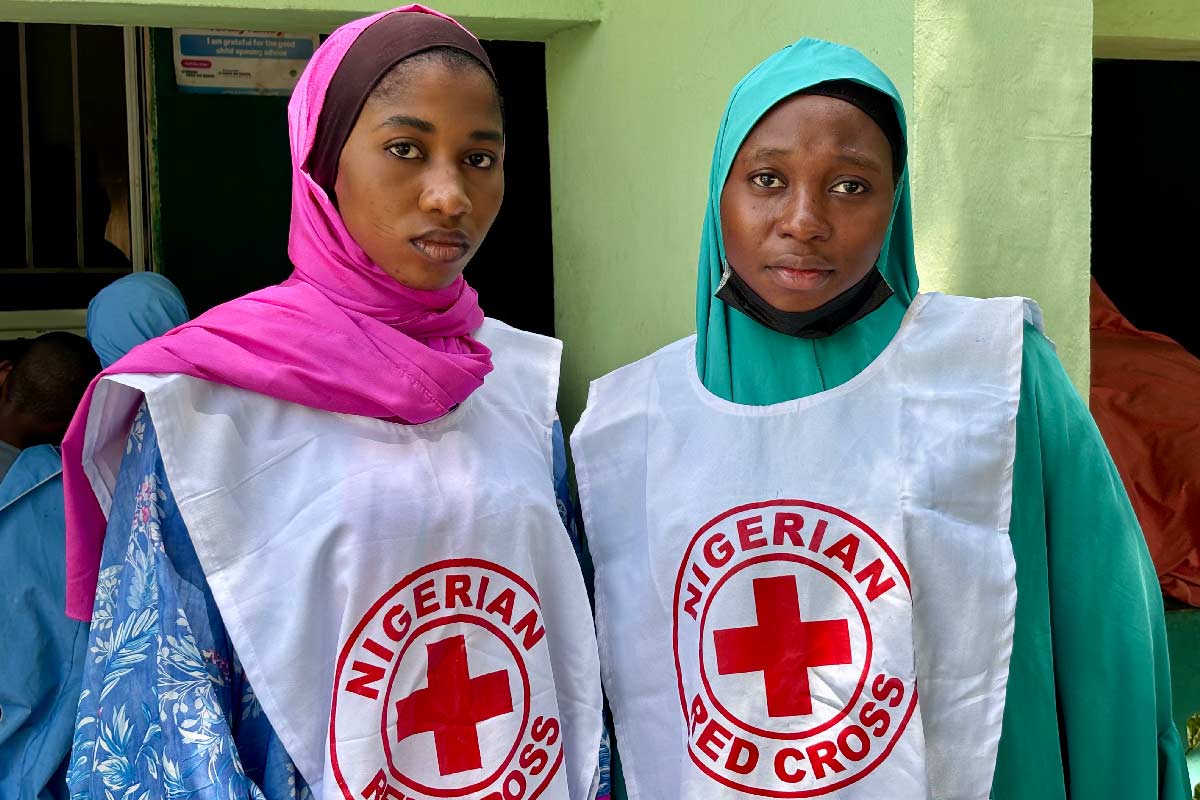
It’s a colossal effort, aiming to reach approximately 106 million children aged 9 months to 14 years with vaccines against MR, polio, and the human papillomavirus (HPV) to protect against cervical cancer, along with other routine immunisations, by the end of the first quarter of next year.
“It is the mother of all campaigns,” described Dr Muyi Aina, the Executive Director of the National Primary Healthcare Development Agency (NPHCDA). “This is the first time we are coming together from different programmes to combine and to make it an integrated service delivery approach,” explained Dr Ahmed-Rufa’I Garba, Director Disease Control and Immunisation at NPHCDA.
Of ambition, coordination and efficiency
Nigeria has the highest number of unvaccinated children in Africa. In 2023 alone, 2.1 million children in the country missed out on all routine childhood vaccines. Although the country has made steady progress over the past two decades by increasing vaccine coverage from 42% in 2000 to 70% in 2023, major gaps persist.
To bridge existing gaps and move closer to the national target of achieving 80% routine immunisation coverage by 2028, Nigeria has integrated additional vaccines into the roll-out of the MR vaccine through a phased implementation plan.
Phase 1 runs from 6 to 27 October 2025, covering states in the northwest, north-central, and northeast regions while Phase 2 begins in early 2026, with Stream 1 in January reaching southwest and parts of the south-south, followed by Stream 2 in February covering the southeast and remaining south-south states.
“We have been preparing since last year,” Dr Garba explained, “and it was meant to be a separate campaign, like a standalone MR vaccine campaign. However, we were guided and steered towards bringing all of it together because these services are meant for the same population. So we are integrating all of the routine immunisation vaccines and the seasonal malaria chemoprophylaxis [SMC].”
The potential efficiency of an integrated package like this one is promising. According to Dr Garba, the cost of conducting a MR vaccine campaign alone is nearly equivalent to that of a standalone polio campaign. “So all standalones would be conducted at a very high cost. Instead of doing vertical campaigns, we have come together to use the same human resource and the same vaccinators to administer the MR, the polio, the HPV.”
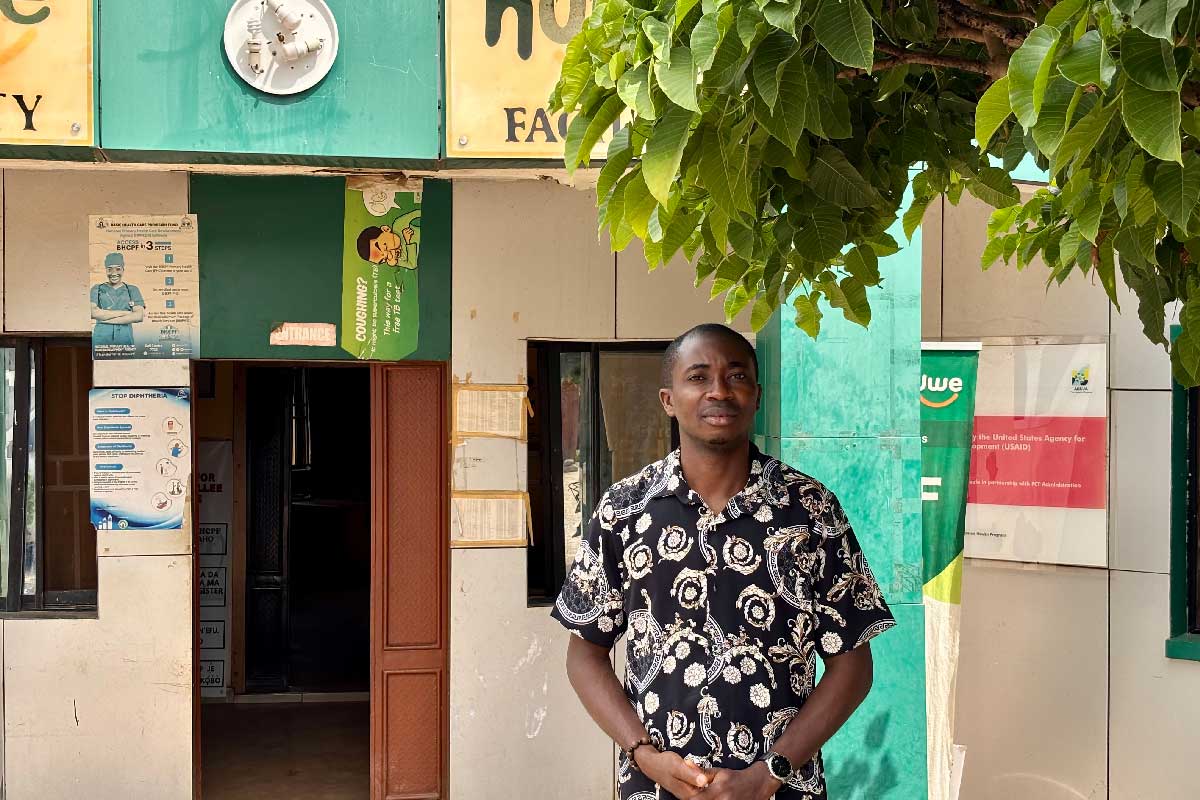
Beyond cost, integration is an effective use of time. “Organising a standalone vaccination campaign typically requires at least three months of preparation,” Dr Garba noted. Since each standalone campaign takes at least three months to prepare, moving from one to another often leaves teams under pressure.
“Bringing everything together helps with coordination. The reporting lines are just one. So, all of the extra time and cost have been eliminated,” Dr Garba pointed out.
Vaccination campaigns demand the coordinated effort of hundreds of intersecting teams, which include vaccinators and supervisors, but also a diverse range of partners. Those include traditional and religious leaders, voices in the media, as well as multiple government departments, from the Ministry of Education, which helps drive awareness and sensitisation, to the Ministry of Women Affairs, which supports community mobilisation. Even the Ministry of Defence is on board, to provide security in hard-to-reach or insecure areas.
And then, there’s a multi-level monitoring system to track campaign progress. A national dashboard monitors state-by-state performance, while state dashboards track progress at the local government area (LGA) level. LGA dashboards, meantime, assess activities at the ward level. Each campaign day, at 20:30, all teams hold review meetings to provide reports on vaccination coverage, supervisory activities and field performance. The NPHCDA also uses the Geospatial Tracking System (GTS) to monitor vaccinators’ movements. Finally, each state has a crisis management team and a non-compliance resolution team, that can step in promptly to address issues – for example, relating to hesitancy – and support underperforming teams.
All hands on deck
For Abuja community health worker Daniel Esther, being part of the campaign feels monumental. For routine immunisation officer, Hafsat Sa’id at Giginyu Primary Healthcare Centre (PHC) in Kano, it’s nothing short of making history.
“We started on Tuesday, but parents began bringing their children as early as Monday because of the extensive mobilisation and sensitisation carried out beforehand. We asked them to return the next day, and they all did willingly,” Sa’id explained, adding that her PHC vaccinates over 200 children daily, serving neighbouring wards such as Kawo and Badawa.
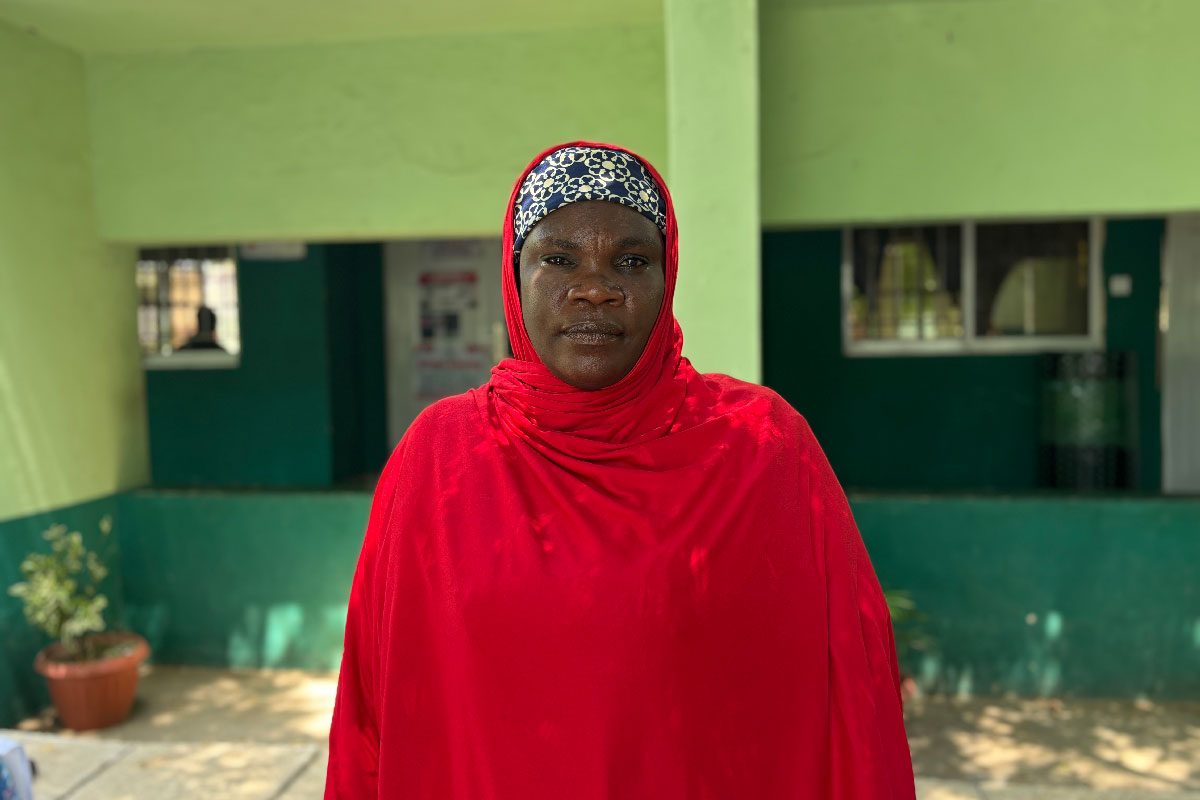
According to Sa’id, the success of the campaign so far could be attributed to the lead-up: weeks of sensitisation and health education. She recalled the initial roll-out of the HPV vaccine, when many vaccinators faced challenges countering misinformation. This time, has been different, with parents turning only to trusted health workers – instead of to the rumour-mill – for accurate information. “Parents know too well the dangers of measles and are seeking out information about this vaccine and the other vaccines. They are giving us all the support we need to meet our goal,” she said.
Sa’id’s greatest hope is to see the eradication of measles and polio. She views her role as a vital link in Nigeria’s fight against vaccine-preventable diseases. And she’s not alone in that commitment. Sadiya Suleiman and Aisha Bello, volunteers with the Nigerian Red Cross, have spent weeks conducting house-to-house mobilisation. “As soon as they see our uniform, they know we have come to talk about their wellbeing. We told them that the MR vaccine would soon be available and that prevention is always better than cure,” Bello said.
Suleiman, for her part, added that before each sensitisation exercise, they ensure they are well-prepared, attending trainings, verifying information, and conducting their own research to be in a position to respond to parents’ questions accurately and confidently. “We are rarely asked a question we cannot answer, and that’s what I love about this role,” she said.
In another part of Kano, Abubakar Ahmed, head teacher of Unguwa Uku Primary School in Tarauni Ward, is also doing his part, too. “The government and other health stakeholders have already created much awareness about the vaccine, so we had a lot of parents calling teachers to ask if it would be administered in the school, and we affirmed. On Friday, a mother even came to make sure her child was vaccinated,” he said.
As a teacher, Ahmed understand himself to be a trusted guide for the pupils. He also considers it his duty to safeguard their wellbeing. “Without healthy children, we cannot run a school. It was helpful that we were informed about the campaign almost two weeks before it began, it allowed us to keep discussing it during school assemblies and at parent-teacher meetings,” he said.
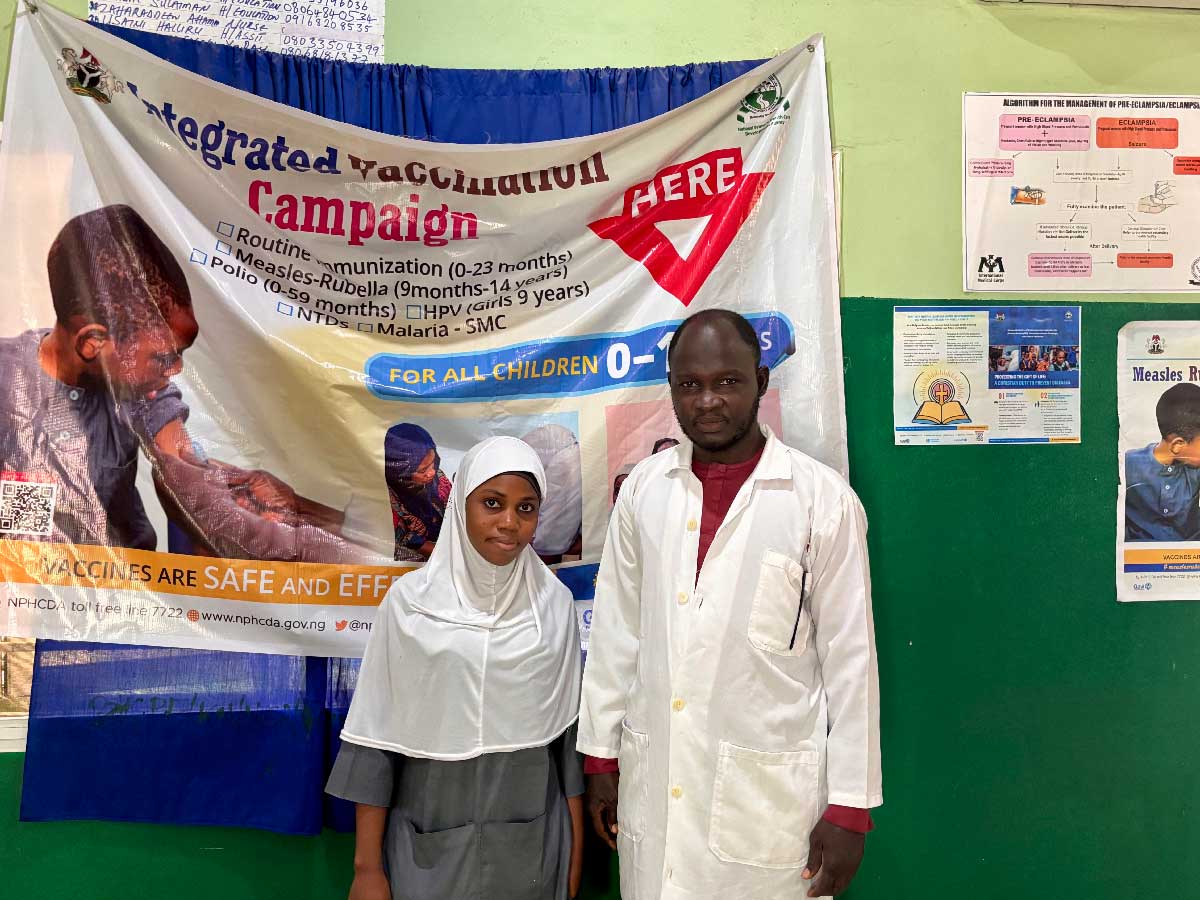
The parental perspective
David Ankeli, a 34-year-old resident of Kuchigoro in Abuja, and father of a two-month-old baby first learned about the campaign on Facebook. This came after months of accompanying his wife to antenatal classes, where he gained a deeper understanding of the importance of routine vaccines. “My willingness came from knowing that my child is protected,” said Ankeli, whose child is too young for measles and rubella vaccination, but old enough to benefit from several other jabs in the Nigerian portfolio.
He commended the agency for carrying out a robust campaign, noting that without such efforts, many families, especially those in hard-to-reach areas, might have missed out, posing a potential risk to public health. He also urged other fathers to be involved. “Recently, my wife’s friend gave birth, and I told the father to support her to ensure the baby receives all the necessary vaccinations,” he said.
Amina Abdullahi, a mother of five children all under six from Tarauni, Kano, says vaccination was something her own parents took seriously too. “Many outbreaks have come and gone, and we were protected from them when we were young. We never experienced any of the side effects people often use to misinform the community,” she said.
Abdullahi described the entire vaccination exercise as well-organised, noting that the vaccinators work diligently, administering vaccines and recording data meticulously, “I feel very fortunate that my five children are among the millions of children being vaccinated.”
Abdullahi noted that it was convenient to have all her children receive several different life-saving vaccines in a single opportunity. “It is time-saving and more affordable for me,” she said. However, she pointed out that while SMCs are provided for children under five, it is equally important for the government to distribute long-lasting insecticidal nets (LLINs) for older children and adults.
She added that mosquito-control fumigation exercises in Kano rarely reach her community, posing a persistent challenge for parents. “Sometimes parents use this exclusion as a reason to hinder their children from getting vaccinated, as a form of protest. We often complain about how mosquitoes affect our health, yet we never receive the right preventive measures as parents,” she said.
Have you read?
More than a campaign
According to Dr Garba, the campaign serves as a stopgap measure and not the primary means of delivering immunisation in Nigeria, as routine immunisation continues daily, or, depending on the health facility, on set days each week. But the campaign has come as a shot to the arm for routine services too, by, for instance helping make sure vaccines and other supplies are fully stocked across PHCs. He also added that cold chain equipment, which some PHCs previously lacked, has now been provided, ensuring that vaccines remain potent as routine immunisation continues beyond the campaign.
Moreover, campaign prep has provided an opportunity to tune up health workers’ training. “We did not just train them on the vaccines alone, but also on proper vaccine handling, managing Adverse Events Following Immunisation (AEFIs), and effective communication, how to talk to people and actually convince them,” Dr Garba explained.
What that means is that Nigeria will emerge from this “mother of all campaigns” not just better-protected in the short-term, but stronger in the long-term. “In general, we now have a more resilient health system and a broader, better trained workforce, one that can provide quality services, guide people back to health facilities, and build their trust, especially as another dose of the MR vaccine is due next year,” he said.






